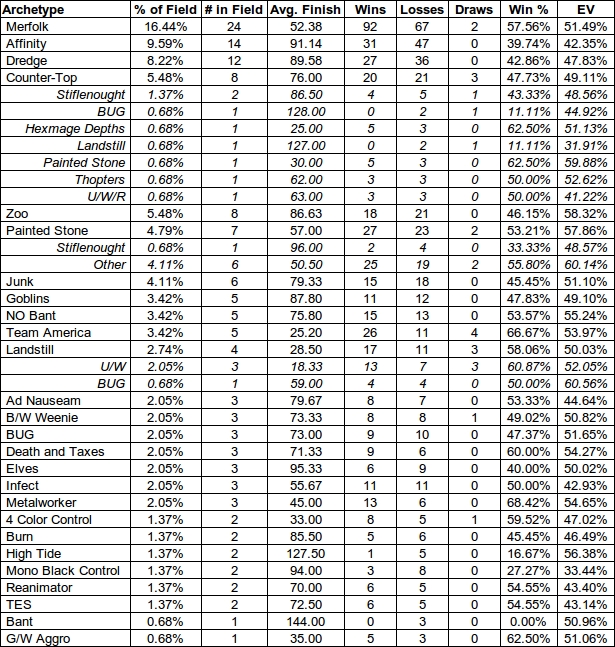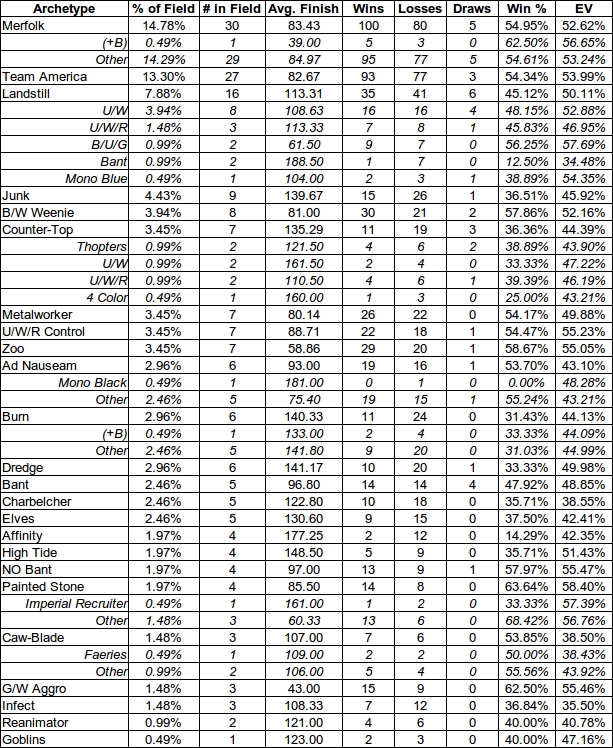For this edition of Too Much Information, we’ll be looking at the results from the Legacy Opens in Orlando and Louisville. This analysis is especially
interesting, for a couple of reasons. Not only are these two events the last Opens to take place before both Grand Prix Providence and the
StarCityGames.com Invitational in Indianapolis, they are also the first to showcase how New Phyrexia has influenced the format.
The breakout performance of heavily blue-based control decks, first with Gerry Thompson Landstill list in Orlando and then with Chris Kronenberger
Mono-Blue list in Louisville, is perhaps the biggest story told by these tournaments. However, what may be even more important for those preparing for
the next two weeks of high-level Legacy is how the rest of the metagame is shifting around those decks. In Orlando, and then in Louisville, we see two
distinct fields, both of which deviate significantly from those in Boston and Charlotte. You can get the raw data here.)
So, let’s get right to it! Here is the breakdown for Orlando, with all of the values calculated using the same methodology we explained previously:
Orlando Legacy Open Breakdown

Merfolk’s position as the top deck only strengthened in Orlando, with both a larger field presence and a better performance than in any other
tournament this year. Surprisingly, no other deck that made up at least 5% of the field managed to win half of its matches. Both Affinity and Dredge
saw an increase in popularity, but both performed extremely poorly. Counter-Top, Zoo, and Junk, which performed relatively well in Boston and
Charlotte, lost more matches than they won in Orlando.
The second-most popular deck to win more than 50% of matches was Painted Stone, which only made up 4.79% of the field.
Bant, with or without Natural Order, was the second-most popular deck in both Boston and Charlotte but was much less of the field in Orlando. NO Bant
largely retained its share of the field, but other varieties dropped off sharply.
The most successful decks in this tournament were Team America and Landstill. Both showed up in small numbers but performed extremely well and put
multiple players into the Top 8.
Louisville Legacy Open Breakdown

The results of Orlando could certainly be felt in Louisville, with Team America and Landstill rising to become the second and third most popular decks.
Merfolk remained on top, but Team America’s 13.30% of the field comes close to catching it. No deck other than Merfolk has been that popular since
Counter-Top at the beginning of the year. Of course, it’s no surprise that the three most prevalent decks in Louisville (which together made up more
than a third of the field) are all quite good at abusing Mental Misstep.
Merfolk and Team America both put up good win percentages, while Landstill did not repeat its strong showing. Junk and Counter-Top continued to perform
very poorly. Affinity and Dredge, which were popular but unsuccessful in Orlando, were much less popular and no more successful in Louisville. Zoo, on
the other hand, performed extremely well.
B/W Weenie, which showed up in Charlotte but was almost completely absent in Orlando, posted a strong record. The few people who played Metalworker
performed well in both tournaments, and there were more of them in Louisville.
Merfolk — 15.47% of Field — Won 56.17% of Matches
Example: Michael Tabler, 8th place — Louisville Legacy Open

Merfolk posted an even or better record against all of the other top decks, and with the exception of the Affinity matchup, it looks like those numbers
are consistent with what we’ve seen so far this year. Interestingly, Merfolk was exactly even against Team America over these two tournaments, despite
being ahead over the course of the year. As more data comes in, we’ll see whether the matchup still favors Merfolk, or if it has gotten closer for some
reason. In either case, with both decks showing up in large numbers and putting up strong finishes, this is likely to be one of the most important
matchups in Providence.
Team America — 9.17% of Field — Won 56.70% of Matches
Example: Chris VanMeter, 1st place — Orlando Legacy Open

Thanks in part to its split with Merfolk, Team America didn’t have a losing record against any of the other top decks either. Unlike Merfolk, Team
America does have a losing record against most of them if we look at the entire year. Like the Merfolk matchup, the other matchups may have actually
changed (because of Mental Misstep, for example), or Team America’s recent successes in those matchups could be anomalous.
Landstill — 5.73% of Field — Won 48.67% of Matches
Example: Gerry Thompson, 2nd place — Orlando Legacy Open

Landstill, in contrast to Merfolk and Team America, didn’t post a positive record against any of the other current top decks (though its overall record
against Affinity is extremely positive). While the deck certainly performed well in Orlando, its difficult matchups against the other popular blue
decks may keep it from seeing that kind of success consistently.
Affinity — 5.16% of Field — Won 35.87% of Matches
Example: N/A

Affinity continued to perform poorly in these tournaments. It, too, failed to beat any of the other popular decks, despite traditionally positive
matchups against both Merfolk and Team America. Those numbers in particular might be flukes, but the deck’s string of poor performances in the past
several tournaments is not likely to be. Whether because artifact hate is common, or the deck is just bad, Affinity looks to be an extremely poor
choice.
Dredge — 5.16% of Field — Won 39.72% of Matches
Example: N/A

Dredge has enjoyed some success this year, but these events were not good to it. Because of the severe drop-off of Dredge players in Louisville, we
don’t have much data to analyze most of the deck’s matchups, but we do see that it lost 13 out of 16 matches against Merfolk. Given Dredge’s historical
difficulties with the fish, this could easily be a case where Mental Misstep has pushed the matchup further out of reach. With Merfolk being the most
popular deck, this does not bode well for Dredge in Providence.
Delving a little deeper into the field, we can examine the next three most popular decks. Some of you might be considering these for the Grand Prix and
SCG Invitational, but they don’t seem likely to be significant portions of either metagame.
Counter-Top — 4.30% of Field — Won 42.86% of Matches
Example: N/A

First up is Counter-Top, which has a strong track record at Legacy Grand Prix. However, it doesn’t seem very well-positioned this time around.
Historically, Counter-Top suffers from Merfolk, Team America, and Landstill matchups that range from unfavorable to dismal.
Junk — 4.30% of Field — Won 40.44% of Matches
Example: David Paschal, 13th place — Louisville Legacy Open

After making the Top 8 at Grand Prix Columbus last year, modern Legacy Junk has been a staple competitor in the Open Series. The deck has performed
admirably for most of the year, but it may have difficulty coping with the new metagame. While the major thing of note is an apparent reversal of the
traditionally favorable Merfolk matchup, this might be an artifact of the small sample. Even so, Junk’s matchups against each of the other top decks
are unexciting, historically, and there is no evidence to suggest that they have improved.
Zoo — 4.30% of Field — Won 53.18% of Matches
Example: David Price, 15th Place — Louisville Legacy Open

In our previous article, we highlighted Zoo as a deck that performed well in Boston and Charlotte and looked well-poised in a Merfolk-centric Legacy.
With Mental Misstep now being legal, it’s a little sketchy to simply tout Zoo’s favorable pre—New Phyrexia matchups against four out of the five
top decks, but what little data we have from Orlando and Louisville is actually consistent with past information. We can still tentatively conclude
that Wild Nacatl is a reasonable choice, although the Team America matchup is concerning.
When we last looked at Legacy, we saw a broad spectrum of playable decks, with relatively well-rounded matchups. This time, things have shifted in such
a way that fewer of the popular decks are doing well, and Merfolk is clearly the deck to beat going forward. Team America is next in line (although its
popularity is a little less predictable), followed by Landstill and other decks seeking to utilize Mental Misstep.
Non-blue decks that might show up in significant numbers include Dredge and Affinity, but don’t expect these decks to do well.
We can recommend Merfolk and Team America, which have performed extremely well over the last two weekends despite being the most popular decks. Less
popular decks that also performed well include Zoo, B/W Weenie, Painted Stone, and Metalworker.
Whatever you plan on playing in Providence or Indianapolis, it had better have a plan against Merfolk and, to a lesser extent, Team America. We have
shown how decks that struggle with those matchups are failing to perform in the current environment. Losing to Cursecatcher is not where you want to be
right now.
Good luck in Providence, and hopefully we’ll see you there!
